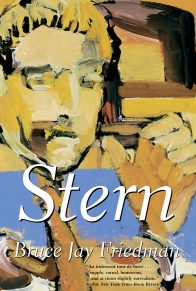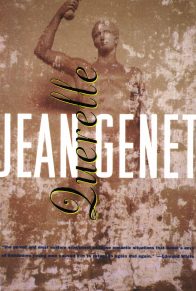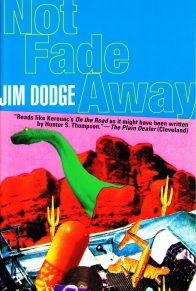DANIEL PEARSE WAS BORN ON THE RAINY DAWN OF March 15, 1966. He didn’t receive a middle name because his mother, Annalee Faro Pearse, was exhausted from coming up with a first and last–especially the last. As near as she could figure, Daniel’s father might have been any of seven men. Annalee decided on Daniel because it sounded strong, and she knew he’d need to be strong.
At Daniel’s birth, Annalee was a sixteen-year-old ward of the Greenfield Home for Girls, an Iowa custodial institution administered by the Sisters of the Blessed Virgin. She had been placed there by court order after attempting to steal an ounce bar of silver from a jewelry-shop display case. She told the arresting officer she was an orphan of the moon, and told the judge that she didn’t recognize the court’s authority to make decisions about her life.
She refused to cooperate beyond giving her name as Annalee Faro Pearse. The judge sentenced her to Greenfield till she was eighteen.
Her second month at Greenfield, Annalee confided her suspected pregnancy to one of her roommates. The next day she was called before Sister Bernadette, a small, severe woman of fifty with an office as meticulously spare as her heart, though not nearly as dour.
‘sit down,” Sister Bernadette said. It was a command, not an offer.
Annalee sat down in the straight-back wooden chair in front of the desk.
Sister Bernadette stared at Annalee’s face for half a minute, then shifted the gaze to her belly. A muscle twitched in the Sister’s flaccid cheek. “I understand you are pregnant,” she said evenly.
Annalee shifted her weight on the hard chair. “I think so.”
“You were raped,” Sister Bernadette almost whispered. “The child will be put up for adoption.”
Annalee shook her head. “I wasn’t raped. I was fucked by a man I loved. I liked it. I want the baby.”
“And who is this loving father?”
“I don’t know.”
“You don’t know.” Sister Bernadette blinked slowly, folding her hands on the desk. “Is that because you never got his name, or because there’s too many names to remember?”
Annalee hesitated a moment, then said firmly, “Both.”
‘so,” Sister Bernadette nodded curtly, “you’re a slut as well as a thief.”
Blue eyes flashing, Annalee stood up.
‘sit down, slut,” Sister Bernadette screamed, slamming the desk top with her open hands as she jumped to her feet. “I said sit down!”
Annalee, just under six feet tall and a little over 130 pounds, broke Sister Bernadette’s jaw with her first punch, a roundhouse right with every bit of herself behind it.
Annalee spent three months alone in what the girls called “the blocks’–a row of tiny cinderblock sheds that had been used for smokehouses when Greenfield was a pig farm. Except for the series of ventilation slits high along the roofline, Annalee’s room was windowless. Nor, with just a saggy cot and a toilet prone to clogging, were her quarters particularly well appointed. She received two meals a day, invariably thin soup, stale bread, and a withered apple. Once a week she was allowed a shower, and once monthly a visit to Greenfield’s doctor, a retired physician deep in his dotage whose main diagnostic technique was having patients do jumping-jacks naked in his office.
For the first time in her life Annalee began a program of daily exercise, which did not include naked jumping-jacks for the doddering doctor. The exercise helped burn off the rancidity of confinement and answered some faint maternal intuition that she needed to be strong for this birth.
Annalee’s regimen occupied about two hours a day. The rest of her time she daydreamed, long spiraling reveries. A week later she felt the baby move inside her for the first time, and her entire attention began a slow pivot inward. Using the spoon that came with her meals, working in the few minutes available between eating and the retrieval of her tray, she scratched what she’d learned into the cinderblock wall: “Life goes on.”
When she returned to her dorm, she was welcomed as a heroine. Sister Bernadette was still eating through a straw, and it was rumored she was being transferred. Annalee didn’t particularly care about Sister Bernadette’s fate. She was worried about her own and her baby’s. The new Mother Superior–Sister Christine, who the girls said was “cool” –told her that Sister Bernadette had decided not to press charges for assault.
“Why not?” Annalee demanded.
Surprised by Annalee’s aggressive tone, Sister Christine sat up straighter at her desk. “Perhaps Sister Bernadette found some compassion in her heart.”
“Only if you could find some in a mustard seed. And if there is any, it’s not much.”
Sister Christine said softly, “It saddens me to hear you say that. I’ve given my life to Christ because I believe in His Divinity and His Wisdom. Central to both, in the heart’s quick, is the power of forgiveness.”
Annalee leaned forward, conscious of her swelling girth. Just as softly, she said, ‘sister, I’ve devoted half my life to survival because I’ve found life mean. Forgiveness is a waste of spirit because there’s nothing to forgive. I believe in the wisdom of what is and the power of right now. I’m pregnant. I intend to keep the baby. It’s my life and the only real power I have is taking responsibility for it. If you deny me that power, we go to war, hopefully on front pages and the six o’clock news. “Pregnant Waif Sues Catholic Prison.” “Little girl orphaned by murder/suicide of parents prays every night in tears: Please God, don’t let them take my baby, she’s all I have left.” Forgive me, Sister, but that’s how it is.”
Sister Christine, eyes bright with tears, reached across the desk and gently squeezed Annalee’s shoulders. “Oh, I wish they were all like you. There are so many who must seek God; only a few whom God must find. I’ll do what I can, but beyond Greenfield my influence is minimal. And I do think you should consider adoption, because you have no way to support the baby once you leave here–assuming by some miracle you’re allowed to keep it here–no skills, no home, no family. If you think life is mean so far, try it with a kid. You’ll end up a thirty-year-old waitress with hemorrhoids and a third husband, so depressed that drugs don’t help, and a kid who hates your guts.”
“How would you know?” Annalee said sharply.
“Because I’ve seen it so many times I can’t even feel the heartbreak any more–or not until I meet someone like you, so strong, so real.”
Annalee covered Sister Christine’s hands with her own. “I’ll make you a vow of my own: If you don’t break my ass, I won’t break your heart.”
At the beginning of her last trimester, Annalee radiated a powerful and vital tranquility. Her roommates held her in awe. Their attitudes and touches softened. They made sure she had extra pillows and any food she desired. They asked her excitedly what it felt like. Annalee told them it felt like she was becoming someone else, and that it was the most amazing thing she could imagine.
The birth was without complications. Nineteen hours later, after the nurse had brought Daniel for his third feeding, Annalee swung out of bed, dressed quickly, and left the hospital with Daniel bundled in her arms.
It was drizzling outside, cold but not quite freezing. Annalee turned left and started down the street, looking for keys in ignitions. The drizzle thickened. She pulled the blanket closer around the child. “Okay, kid,” she said, “here we go.”
* * *
Letting the road rock the baby against her breast, Annalee sang along with Smiling Jack Ebbetts, the Singing Truck Driver, as they roared down I-80 West in the tuck-and-roll cab of his “49 Kenworth. Annalee had stolen a car five blocks from the hospital, but, deciding it was too risky to stay with for long, had ditched it near the Interstate and put out her thumb. In less than a minute Smiling Jack pulled over, and they were fifty miles gone before the engine had cooled on the stolen Ford.
Smiling Jack Ebbetts didn’t haul freight. He made his living singing at truckstops and bars across the country, performing as it pleased him or finances required. He lived in the long-box trailer the Kenworth hauled. The trailer had a small kitchen, cozy living room, cramped shower and toilet, and two tiny bedrooms in the rear. The rig, Smiling Jack explained, represented a compromise between his homebody heart and his vagabond soul.
As good-humored as his name implied, Smiling Jack was in his late thirties. He had a faded IWW button on his Stetson’s band and a pair of rolling dice on his belt buckle. Annalee liked him immediately. When he asked what she was doing on the road with such a young baby–”looks like he’s barely dried off” –Annalee told her story. He sounded two long blasts on the airhorn when she recounted breaking Sister Bernadette’s jaw.
“Well all right” he crowed admiringly when she’d finished. “You got it straight as far as I’m concerned.” He reached over and patted her shoulder. “You’ll do fine. You got heart, you got brains, and you got the spirit to keep “em glued together.” He turned his attention back to the road. “You got any idea where you and this newborn fellow here are going?”
“California, I guess. I want to be warm.”
“Got people there?”
“No.”
“Any money?”
“No.”
“I’m a mite depleted myself at the moment,” Smiling Jack said, “but when we hit Lincoln I want to buy li”l Daniel here some duds for his birthday. Shirt and jeans and stuff. And some diapers.”
“That’s kind,” Annalee told him, “but please don’t spend what you can’t afford.”
Smiling Jack smiled. “If I don’t spend it, how do I know what I can afford?”
Smiling Jack taught her some of the songs in his bottomless repertoire, and they practiced them together as they crossed Wyoming, down through Evans and Salt Lake City. They worked out harmonies as the big diesel hauled them across the salt flats into Nevada, Daniel asleep between them on the seat, or nursing.
Annalee and Smiling Jack sang together three nights at a bar in Winnemucca, followed by a weekend gig at a small club in Reno. Smiling Jack gave Annalee forty percent of the take and paid all expenses. When they crossed Donner Pass and dropped into California, Annalee had a used bassinet, an old stroller with bad wheel bearings, and seventy-five dollars in the pocket of her Salvation Army jeans.
They stopped that afternoon east of Sacramento, Annalee washing diapers at the laundromat while Smiling Jack changed the oil in the truck. Back on the road, Smiling Jack said, “I was thinking back there, all scrunched up under the rig and watching oil drip in the pan, that I might have a proposition for you and the boy. You see, I got this half-ass ranch way the hell and gone out Spring Ridge, which is about a hundred and fifty crow-miles north of “Frisco, couple of miles inland from the coast. My uncle won it in a card game back in the thirties–four deuces against aces full. Not the dead mortal nuts, but like Uncle Dave said, good enough to take it all. Uncle Dave willed it to me when he cashed out five years ago. It’s about two hundred acres, big ol” redwood cabin, clean air, good spring water. Nearest neighbor is seven miles of dirt road, so it’s bound to cramp your social life, but it might be just the place to hunker down a spell till the wind drops, if you know what I mean. I can’t stand the ranch because it’s always in the same place and the taxes come right out my tank, so if you’re interested, I’m in the mood to deal. Rent would be taxes and caretaking; stay as long as you want. The taxes are $297 a year, and they’re already paid till next January. If you want to give it a shot, country life is great for kids. And if you’re still there next time I come through, I might have a job that’ll make you a little money. Till then, you’d be on your own. What do you say?”
“Thank you.”
Smiling Jack laughed. “Hell’s bells, you deserve it, sweetheart. Don’t feel obliged.”
Smiling Jack’s Kenworth was too much for the narrow rutted road, so they walked the last mile to the ranch, taking turns carrying Daniel. Four spread deuces were nailed to the cabin door, the cards so sun-bleached they appeared blank. The cabin was festooned with spider webs and littered with woodrat droppings, but nothing a broom and scrub brush couldn’t fix. The woodshed roof sagged under the weight of a thick limb a storm had torn from a nearby apple tree, but the shed itself contained three cords of seasoned oak. Smiling Jack showed her where the kerosene was stored and how to fill and trim the lamps, instructed her on using the woodstove and propane refrigerator, produced bedding from an old seaman’s chest, and generally squared her away. Out on the back porch, in the warm sunlight, they shared a lunch of sourdough bread and cheese they’d purchased the previous evening in San Francisco. After lunch, Smiling Jack waved farewell and headed up the road toward his truck.
Daniel started to cry. Annalee unbuttoned her blouse and offered a breast. Daniel pushed it away and cried louder. Annalee was sixteen; Daniel, barely two weeks. It was April Fools’ Day. She was somewhere in California, in a drafty, shake-roof cabin built by some shepherd in 1911, with nothing to eat but some bread, cheese, and a few rusty cans of pork and beans in the cupboard. She had sixty-seven dollars in her pocket. “You’re right,” she blurted to the bawling Daniel, and started crying, too. Then she got to work.
The cabin caulked and spotless, water hooked up, Annalee hitched to San Francisco with Daniel in her arms ten days later. It took them three rides and twelve hours. They spent the night in a Haight Street crash pad where a woman in her early twenties, who called herself Isis Parker, offered her a joint and the use of her father’s American Express Card.
The next morning Annalee checked the Chronicle Want Ads under babysitters, made a few calls, settled on a woman with a sweet voice, caught the bus and delivered Daniel, then headed downtown to abuse Isis’s father’s credit card. She bought Daniel a whole shopping bag full of clothes. For herself, she chose a stylish tweed suit, matching bag and shoes, three pairs of hose, and a gray silk blouse.
That afternoon a middle-aged broker coming out of Bullock & Jones was stopped by a tall, lovely young woman–a girl, really–wearing an impeccably tailored suit. The young woman was clearly distraught. “Ex-excuse me,” she stammered, “but” but my purse was just stolen and “,” she faltered, blushing, then continued bravely, “I have to buy some sanitary napkins.”
Bam. A hundred dollars an afternoon. She generally worked the financial district, taking care to choose well-dressed men in their fifties because they tended to cover their embarrassment with generosity. A few declined, usually just walking away without a word. One fainted. She never tried it on other women. They were too smart.
In all, it was the perfect nick, so good that even its clearest failure proved its greatest success. One crisp October afternoon she approached a tall, dapper man with graying hair as he left the Clift Hotel. He listened attentively to her plight, immediately reached for his wallet, and handed her a hundred-dollar bill. Annalee had never seen one before. She counted the zeros twice. “Ill bring you the change,” she managed to say, thinking somehow she would.
“Nonsense.” The man grinned. “You keep what’s left after the Kotex–which I imagine will be a hundred dollars. It’s an excellent hustle. Talent’s rare these days, and deserves encouragement. Besides, I just won eight grand in a poker game and I like to keep the money moving.”
“Well, go get “em, cowboy,” Annalee laughed. She was still laughing when she picked up Daniel.
She usually worked the city once a month. At first she just worked an afternoon, but after Daniel was weaned she’d leave him with a sitter for two or three days while she hit Montgomery Street and spent the evenings and nights with the young artists and revolutionaries in the Haight, smoking weed and drinking wine. She was attracted to poets and saxophone players, but hardly confined herself to their company. She never took any of them home.
Annalee and Daniel spent the rest of each month at the ranch. She’d bought a single-shot .22 with her earnings, and she occasionally killed a deer or wild pig, freezing what she could cram in the refrigerator’s tiny box, drying or canning the rest. There was a large garden and a dozen chickens and ducks. The old orchard still produced, and nearby Cray Creek held small trout year-round, with salmon and steelhead arriving in the fall. She worked hard, but they lived well, buying the few things the land didn’t provide.
Annalee spent the evenings reading library books her poet friends had recommended or playing the old guitar she’d found under the bed, making up songs for Daniel’s amusement. Song, in fact, was his first word. But he was talking well enough to rush in excitedly and announce, ‘mom, someone’s coming,” when Smiling Jack, three years late, finally returned.
Annalee and Jack greeted each other with whoops and hugs on the front porch. Smiling Jack had hardly changed–a touch more gray in his hair, the smile-wrinkles around his eyes perhaps more pronounced. But Annalee had changed immeasurably: At nineteen she looked strong, solid, and wild. Her movements carried a sense of ease and grace, and her eyes looked right at you. Smiling Jack was impressed. He held her at arm’s length, declaring, ‘sweet Lord o’ God, girl, but if you ain’t lookin” about nine hundred forty-seven percent better than the last time I seen you. You must take to this country living.”
Annalee laughed, tossing her hair. She said to Daniel, who was standing in the doorway, “This is Smiling Jack Ebbetts, the man who let us stay here.”
“Hi,” Daniel said.
“It’s a pleasure, Daniel.” Smiling Jack offered his hand, which Daniel eyed hesitantly before shaking. ‘doubt if you remember this crazy ol” double-clutcher, “cause you hadn’t made a month o’ life when I swept you and your momma off the cold shoulder of I-80 right outside Des Moines and hauled you on out here to look after the Four Deuces, but I sure remember you and our long, sweet ride to the coast.”
“I don’t remember you,” Daniel said.
“Not many folks remember very much from when they were babies.”
“Yeah,” Annalee said, “but when most people say they’ll be back in a few months, they aren’t three years late.”
“Had to see if you were serious about making a go of it here.”
Annalee folded her arms across her breasts. “We’re still here.”
“Naw,” Smiling Jack waved dismissively, “I was joshing on that–never had a doubt. What happened was I got involved in all sorts of family stuff back in Florida, and then on my way back out here, I found a monster three-card monte game in Waco. Lost my truck seven times.”
Annalee nodded. “And how many times did you win it back?”
“Eight or nine,” Jack smiled hugely, “plus enough money to burn a wet mule.”
“Well come on in,” Annalee said, gesturing toward the door. “I’ll help you count it.”
Smiling Jack broached another proposition to Annalee when they’d finished lunch. ‘me and some friends have a notion to use this place as a safe house, and–”
“What’s a safe house?” Annalee interrupted.
“Just a fancy term for a hideout, I guess. A safe place.”
“Running from the law?”
“Generally,” Jack nodded. “Not always, though. Sometimes just resting.”
“And the proposition?”
“I want you to run it. Take care of the people.”
‘do you have eight or nine trucks really?” Daniel cut in, tugging at Smiling Jack’s sleeve.
“No, pardner, just one. A “49 Kenworth diesel.”
“I’d like to ride in it,” Daniel said.
“You’re on, but you’re gonna have to wait a little bit. Right now your momma and me are doing some business negotiation.”
“Okay,” Daniel said. He went outside.
Smiling Jack turned back to Annalee. “You’d get a thousand dollars a month, plus free rent, whether the place is used or not–and most often it won’t be.”
“What sort of people will I be dealing with?”
“The very best.” His voice promised it.
“What happens if somebody finds these people they’re looking for? I don’t want Daniel at any risk.”
“I can’t guarantee that. All I can tell you is that they won’t be coming here till they’re very cool. This will sort of be the next to last move, a staging stop while the final move is being set up.”
“How much am I supposed to know about these people?”
Smiling Jack shrugged. “Whatever they tell you.”
“And “take care of them.” What exactly does that mean?”
‘shop, cook, keep “em company if you feel like it.”
‘mostly men?”
“I don’t know.”
“What about children?”
“Possibly. I really don’t know.”
“I couldn’t do it for long. Daniel should start school in a few years.”
Smiling Jack quit smiling. “You ain’t gonna send him to school? There’s nothing he’s gonna learn there but how to get along with other kids under completely weird conditions. Right out that door is the best education in the world. But hell, you do what you think’s best–don’t listen to me. I’m a tar-ass reactionary on the subject. Had my way, no kid would learn an abstract word till they was ten years old. Wouldn’t get their minds so gummed up.”
“I’ll think about school, but I can’t promise we’ll be staying. I’ll do it for a thousand a month, two years for sure–but after that we’re free to go.”
Smiling Jack’s smile returned. “Or free to stay. We can work out the details later. Just needed to know if you were interested. Wasn’t presuming you would be, but I brought a load of lumber to build a little guest room down the hill. Three in here is a tad close.”
“What would you have done if I’d said no?”
“Leave you be and find another place.”
“And what makes you think I wouldn’t betray these people in a cold second for two thousand bucks?”
“If I thought you’d sell “em out for two million, I wouldn’t be talking to you.”
“Jack, if your criminal friends are half as sweet as you, I’ll give you back the grand a month and call it even.”
“Outlaws,” Smiling Jack said. “Not criminals: outlaws. My friend Volta says there’s an important difference. Outlaws only do wrong when they feel it’s right; criminals only feel right when they’re doing wrong.”













